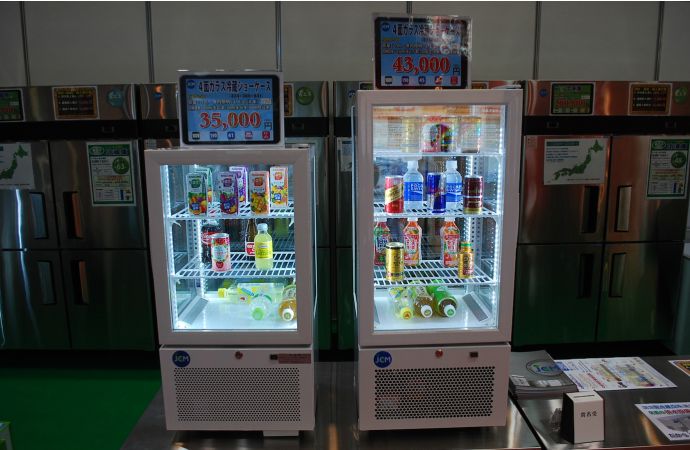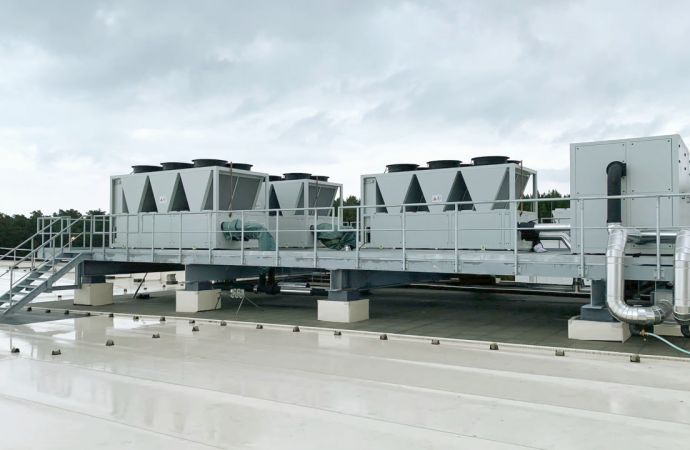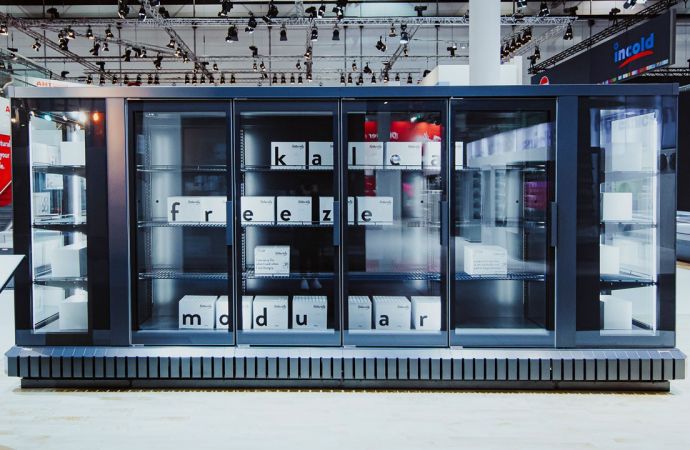The market for hydrocarbons in Japan is beginning to pick up, with a marked increase in the number of hydrocarbon suppliers appearing in major tradeshows this year.

JCM's hydrocarbon bottle coolers at HCJ, Tokyo Big Sight, 21-24 February
Two Japanese light commercial showcase suppliers were displaying hydrocarbon units at their booths this year at HCJ, Japan’s largest exhibition for the hospitality, food service, and catering industries.
HCJ is a combination of three events held simultaneously: HOTERES Japan, for hotels and restaurants, CATEREX Japan, for catering and food service, and Japan Food Service Equipment, for commercial food service equipment.
Held this year from 21-24 February, the event welcomed over 57,000 attendees from over 850 companies at the Tokyo Big Sight exhibition hall.
Japanese showcase manufacturer JCM became the first company to offer light commercial hydrocarbon showcases on the domestic market at last year’s HCJ tradeshow.
Along with its current offering of R600a and R290 freezer cabinets and bottle coolers, the firm displayed an expanded hydrocarbon line-up which included two new types of R600a vertical showcases.
“We’ve replaced R134a with R600a and R404A with R290. Going forward, our company will be using natural refrigerants as much as possible,” said JCM President Ma Shoha.
Tokyo-based showcase manufacturer Tenpos was also present, showcasing its line-up of eight different types of R600a freezers and display cases.
Katsuya Tano, merchandise manager for Tenpos, revealed that the firm ships 12-13,000 units of R600a showcases per year from its factory in China.
Following the global hydrocarbon lead
Natural refrigerants were notably absent from the light commercial portfolios exhibited by display case market leaders Daiwa Reiki, Hoshizaki and Fukushima at the tradeshow. Representatives from the three companies cited the lack of Japanese natural refrigerant-based compressor manufacturers as the reason for this. If compressor manufacturers like Hitachi and Toshiba start using natural refrigerants, then we will need to go in that direction, they commented.
This begs the question, if the leading suppliers are not going with natural refrigerants, why are the smaller ones choosing to do so?
JCM President Ma Shoha explained: “Right now the big companies are moving really slowly, so, for us, it was a bit of a challenge to start using natural refrigerants. However, we decided to go with natural refrigerants 4-5 years ago after watching European environmental policy develop and also because we are seeing a large amount of R600a and R290 refrigeration systems being used in Europe and America."
For light commercial hydrocarbon units, safety is not an issue, Shoha says, "because we don’t use over 150g, which is the international charge limit”.
Crucial moment for Japanese manufacturers
One issue holding back hydrocarbons in Japan is the lack of domestic hydrocarbon compressor manufacturers. In other countries, however, light commercial equipment suppliers are continuing to convert their line-ups completely to hydrocarbons.
As previously reported by hydrocarbons21.com, Minus Forty Technologies – a Canadian manufacturer of freezer and refrigerated cabinets – boasts of having already converted all but one of the 36 products in its portfolio to R290.
“We’ve been working towards converting our entire product line up to R290 for two years now,” Chris Strong, the company’s vice-president of sales and marketing, told hydrocarbons21.com at the NAFEM Show in Orlando, Fla.
We also need hydrocarbon compressors which are made specifically for the Japanese market, otherwise it will continue to be difficult for us to convert to natural refrigerants.”
- JCM President Ma Shoha
JCM President Shoha said: “You can see a lot of movement in the global hydrocarbon market. Big compressor companies, like embraco, are expanding their hydrocarbon line-ups. This makes it easier for companies like us to go with natural refrigerants.”
However, he worries that Japan may fall behind.
“We also need hydrocarbon compressors which are made specifically for the Japanese market, otherwise it will continue to be difficult for us to convert to natural refrigerants,” Shoha warned.
As evidenced by the growing number of international hydrocarbon showcase and component suppliers entering the Japanese market, end users and suppliers in Japan are becoming increasingly aware of the economic benefits and global trends for hydrocarbons.
Related stories




